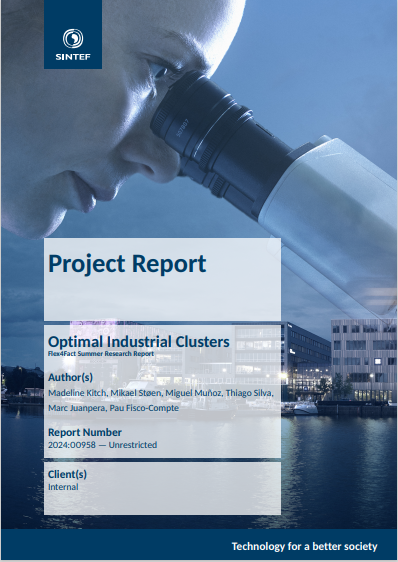F4F Summer Research Report
We are happy to announce the release of the Flex4Fact Summer Research Report entitled “Optimal Industrial Clusters”. This comprehensive research report, authored by Madeline Kitch, Mikael Støen, Miguel Muñoz Ortiz, Thiago Lima Silva, Marc Juanpera and Pau Fisco-Compte, focuses on the optimisation of energy use within industrial clusters, with a special emphasis on the integration of digitalisation, smart scheduling, local renewable energy production and variable energy prices.
Key Insights from the Report
The study addresses how industrial companies can use collaborative energy management to optimize energy consumption, reduce costs, and improve sustainability. By analyzing different energy optimization approaches—such as centralized energy consumption and local-level trading of energy surplus—the report demonstrates how industrial clusters can benefit from shared energy solutions. These solutions lead to lower aggregate costs due to the elimination of sell-back penalties, and their relative benefit among firms depends on internal pricing mechanisms.
Summary of Findings
- Centralized vs. Local Optimization: The report examines two main approaches to energy optimization. The centralized model aims to manage all energy consumption for an entire cluster, while local-level energy trading allows firms within the cluster to exchange surplus energy.
- Cost Reductions: Data from the Flex4Fact project show that clustering energy consumption and utilizing internal trading systems can lead to significant cost reductions by minimizing sell-back penalties.
- Graph-Based Modeling: The report introduces a graph-based computational package using mixed-integer programming models to simulate and test energy optimization in industrial clusters. These models enable firms to assess various production and energy use scenarios effectively.
Future Applications
The findings from this report highlight the potential for industrial clusters to achieve greater energy efficiency and cost savings through collaborative energy management practices. By leveraging tools like digital twins and smart scheduling, industrial companies can better integrate local renewable energy sources and respond more flexibly to variable energy prices.
The full report is available for download here: SINTEF_Report_Optimal_Industrial_Clusters.pdf (flex4fact.eu)
